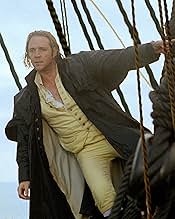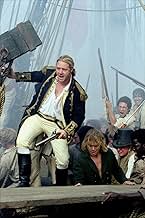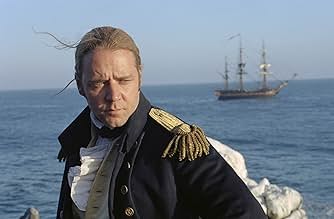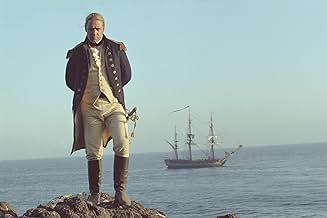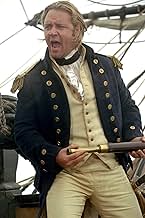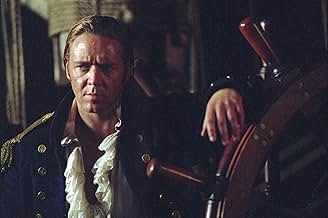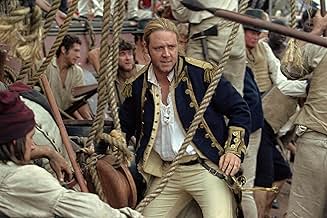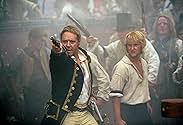दौरान नेपोलियन युद्ध, एक ब्रश ब्रिटिश कप्तान दक्षिण अमेरिका के चारों ओर एक दुर्जेय फ्रांसीसी युद्ध पोत की खोज में अपने जहाज और चालक दल को अपनी सीमा तक धकेल देता है।दौरान नेपोलियन युद्ध, एक ब्रश ब्रिटिश कप्तान दक्षिण अमेरिका के चारों ओर एक दुर्जेय फ्रांसीसी युद्ध पोत की खोज में अपने जहाज और चालक दल को अपनी सीमा तक धकेल देता है।दौरान नेपोलियन युद्ध, एक ब्रश ब्रिटिश कप्तान दक्षिण अमेरिका के चारों ओर एक दुर्जेय फ्रांसीसी युद्ध पोत की खोज में अपने जहाज और चालक दल को अपनी सीमा तक धकेल देता है।
- 2 ऑस्कर जीते
- 23 जीत और कुल 90 नामांकन
फ़ीचर्ड समीक्षाएं
There is a scene in MASTER AND COMMANDER: THE FAR SIDE OF THE WORLD where the captain of a British Naval ship, circa 1805, debates the difference between duty and passion. Having passed on an opportunity to make wonderful new discoveries in favor of the pursuit of a massive French war ship, the scene manages to make a rather eloquent, yet subtle comment on the nature of man and his place within the world. The beauty of this film is that there are many such moments where the viewer is simultaneously bombarded with thematic musings, exciting action sequences, great acting and historical accuracy to the point where it becomes difficult to take it all in at once.
Those of you looking for something more like Pirates of the Caribbean will be disappointed as this film is short on action and long on character development. There are only two major battle sequences, separated by more than an hour and a half of time. And while they are great; violently realistic and dramatically involving, the real guts of this film lies in the human stories told along the way. The director, Peter Weir, highlights his ability to tell an intimate story amidst a grand backdrop much like he did in The Truman Show. We get to know these men, their strengths and weaknesses and we see how the long and hard voyage plays on their minds over the film's progression. In one scene, a young officer feels the pressure of his men's dismissive stares and decides to end matters in his own way, afraid of what may be in store for him should he stick it out. Weir does a good job at highlighting the many facets of seafaring life.
If you're looking for an intelligent and thought-provoking journey into the life of a 19th Century British Naval Vessell, look no further. Master and Commander has the depth of a good Discovery Channel show and the action worthy of almost any other high-seas adventure that comes to mind.
Those of you looking for something more like Pirates of the Caribbean will be disappointed as this film is short on action and long on character development. There are only two major battle sequences, separated by more than an hour and a half of time. And while they are great; violently realistic and dramatically involving, the real guts of this film lies in the human stories told along the way. The director, Peter Weir, highlights his ability to tell an intimate story amidst a grand backdrop much like he did in The Truman Show. We get to know these men, their strengths and weaknesses and we see how the long and hard voyage plays on their minds over the film's progression. In one scene, a young officer feels the pressure of his men's dismissive stares and decides to end matters in his own way, afraid of what may be in store for him should he stick it out. Weir does a good job at highlighting the many facets of seafaring life.
If you're looking for an intelligent and thought-provoking journey into the life of a 19th Century British Naval Vessell, look no further. Master and Commander has the depth of a good Discovery Channel show and the action worthy of almost any other high-seas adventure that comes to mind.
In April 1805, Napoleon rules Europe. British frigate H.M.S. Surprise under the command of Captain Jack Aubrey (Russell Crowe) is ordered to intercept French Privateer Acheron. In the first battle, Aubrey quickly discovers that Acheron is actually bigger, faster and more powerful skippered by a smart tactician. He escapes only through his skills and experience. After being soundly beaten, Aubrey decides to keep going instead of returning to base to refit. The ship's surgeon and Aubrey's friend Dr. Stephen Maturin (Paul Bettany) clash with him more and more as the far ranging battle continues.
The action is exciting and more realistic than sail seafaring battle movies before it. The most compelling are the splinters that fly everywhere. It is the CGI that pushes the envelop on this action. Realism is everywhere. It is dirty, ugly, bloody, and horrifying. Russell Crowe delivers a solid performance to anchor this movie in reality. Then there are the everyday things that happen in between the battles. This has the epic scale conflicts but the human size struggle.
The action is exciting and more realistic than sail seafaring battle movies before it. The most compelling are the splinters that fly everywhere. It is the CGI that pushes the envelop on this action. Realism is everywhere. It is dirty, ugly, bloody, and horrifying. Russell Crowe delivers a solid performance to anchor this movie in reality. Then there are the everyday things that happen in between the battles. This has the epic scale conflicts but the human size struggle.
Few films manage to capture the era in which the original work was set and often rely on clichés of the particular genre at the expense of the core story. This film manages to avoid these pitfalls but more importantly serves as a worthwhile historical document. Anyone who is new to this period of history will not go far wrong keeping a copy of this movie as the attention to detail is excellent and adds to the experience as a whole (teachers take note).
This movie manages to tread a fine line between gritty realism and Boy's Own, portraying the pursuit of an elite French warship by an older embattled British frigate. The production values are very high and the dialogue and length allow the director a better than average framework for character development. The predominantly unknown British supporting cast (some aged as young as 12) are expertly handled and provide a counter balance to the excellent performances of Crowe and Bettany. Crowe's delivery is very reminiscent of Richard Burton, exuding a measured screen presence without overpowering the dialogue.
It would have been easy for the director to read through the salty notes of previous period pieces and deliver the usual tale of ocean going brutality and scurvy encrusted woe but Peter Weir's version of order through respect and camaraderie is far more believable especially when you realize that the sailor's greatest enemy was the ocean itself.
I found little to dislike and much to admire. Highly recommended.
This movie manages to tread a fine line between gritty realism and Boy's Own, portraying the pursuit of an elite French warship by an older embattled British frigate. The production values are very high and the dialogue and length allow the director a better than average framework for character development. The predominantly unknown British supporting cast (some aged as young as 12) are expertly handled and provide a counter balance to the excellent performances of Crowe and Bettany. Crowe's delivery is very reminiscent of Richard Burton, exuding a measured screen presence without overpowering the dialogue.
It would have been easy for the director to read through the salty notes of previous period pieces and deliver the usual tale of ocean going brutality and scurvy encrusted woe but Peter Weir's version of order through respect and camaraderie is far more believable especially when you realize that the sailor's greatest enemy was the ocean itself.
I found little to dislike and much to admire. Highly recommended.
Epic. It is the first word defining it. But , scene by scene, the nuances are more significant. For a lot of reasons. The performances could be the first. And the most seductive. The memories about adventure and historical literature from. early years is the second. Not the last - the thrill of story, remembering huge drama. And the art of a real good adaptation.
"Master and Commander: The Far Side of the World" is half swashbuckling action movie, half detailed examination of life in the 19th-century British navy, and all entertaining. Director Peter Weir has created an intriguing film that nicely balances fierce battle sequences with quiet, intimate scenes.
Nearly all of the film takes place aboard the HMS Surprise, under the command of Captain "Lucky" Jack Aubrey (Russell Crowe). The captain's orders: to intercept and disable the French privateer Acheron, which is troubling British vessels off the coast of South America. The two ships clash early on, and the Surprise is thoroughly routed--the Acheron is larger, faster, and more modern. But Aubrey, with a determination that might not entirely be due to his sense of duty, is not one to give up, and the Surprise chases the Acheron--and/or vice versa--down the Brazilian coast, around Cape Horn, and to the Gallapagos Islands.
That's the action part. The intimate part involves Aubrey's relationship with the ship's surgeon, Stephan Marutin (Paul Bettany). Stephan is a quiet intellectual and devout naturallist, whose train of thought is foraying into the territory that would make Darwin a household name later in the century. He's also the only one among the crew who's either willing or able to call Aubrey's decisions into question. He provides a grounding force for the captain, and the friendship between these two dissimilar men is the emotional heart of the story.
I've yet to read any of the Patrick O'Brian series upon which "Master and Commander" is based, but the movie shows every evidence of being derived from a painstakingly and meticulously detailed work, one which has gone to great lengths to re-create the world and environment of these men. The details on screen are wonderful, depicting the sort of harsh conditions that make the contestants on those "reality" series look like the overglorified wimps they are. The crew of the Surprise (many of them not older than twenty) lives in claustrophobic and none-too-clean quarters--at times it seems as if every inch of the screen is crammed full--and sleep in hammocks that may very well end up serving as their shrouds. Battles are chaotic, with cannon fire ripping huge holes in the ship and sending shrapnel in every direction. The weather seems to exist only in extremes: still heat, raging tempests, even snow as they drift down near the Antarctic circle. Good service is rewarded with extra rations of grog and brandy, insubordination is punished by the whip. It's a place where both close friendships and deep resentments can grow, and the tension in the air at times feels like a living presence.
Crowe dominates the production, once again proving himself one of the best leading men working in movies. In his hands, Jack Aubrey is a natural leader of men: clever, courageous, determined, and capable of what nowadays is called "thinking outside the box." He is frequently confronted with difficult choices, but takes his responsibilities and the consequences of his actions unflinchingly. Bettany turns in an equally good performance as Aubrey's emotional and ideological opposite; the two men play wonderfully off of each other. Most of the rest of the crew tends to blur together (the exceptions include a young officer who's right arm gets amputated early on, and later takes command of the ship), but "Lord of the Rings" fans will be amused to notice Billy Boyd among the ranks.
The combination of action and introspection in "Master and Commander" at times seems like an odd mix, but the film succeeds on both levels. Definitely a voyage worth taking.
Nearly all of the film takes place aboard the HMS Surprise, under the command of Captain "Lucky" Jack Aubrey (Russell Crowe). The captain's orders: to intercept and disable the French privateer Acheron, which is troubling British vessels off the coast of South America. The two ships clash early on, and the Surprise is thoroughly routed--the Acheron is larger, faster, and more modern. But Aubrey, with a determination that might not entirely be due to his sense of duty, is not one to give up, and the Surprise chases the Acheron--and/or vice versa--down the Brazilian coast, around Cape Horn, and to the Gallapagos Islands.
That's the action part. The intimate part involves Aubrey's relationship with the ship's surgeon, Stephan Marutin (Paul Bettany). Stephan is a quiet intellectual and devout naturallist, whose train of thought is foraying into the territory that would make Darwin a household name later in the century. He's also the only one among the crew who's either willing or able to call Aubrey's decisions into question. He provides a grounding force for the captain, and the friendship between these two dissimilar men is the emotional heart of the story.
I've yet to read any of the Patrick O'Brian series upon which "Master and Commander" is based, but the movie shows every evidence of being derived from a painstakingly and meticulously detailed work, one which has gone to great lengths to re-create the world and environment of these men. The details on screen are wonderful, depicting the sort of harsh conditions that make the contestants on those "reality" series look like the overglorified wimps they are. The crew of the Surprise (many of them not older than twenty) lives in claustrophobic and none-too-clean quarters--at times it seems as if every inch of the screen is crammed full--and sleep in hammocks that may very well end up serving as their shrouds. Battles are chaotic, with cannon fire ripping huge holes in the ship and sending shrapnel in every direction. The weather seems to exist only in extremes: still heat, raging tempests, even snow as they drift down near the Antarctic circle. Good service is rewarded with extra rations of grog and brandy, insubordination is punished by the whip. It's a place where both close friendships and deep resentments can grow, and the tension in the air at times feels like a living presence.
Crowe dominates the production, once again proving himself one of the best leading men working in movies. In his hands, Jack Aubrey is a natural leader of men: clever, courageous, determined, and capable of what nowadays is called "thinking outside the box." He is frequently confronted with difficult choices, but takes his responsibilities and the consequences of his actions unflinchingly. Bettany turns in an equally good performance as Aubrey's emotional and ideological opposite; the two men play wonderfully off of each other. Most of the rest of the crew tends to blur together (the exceptions include a young officer who's right arm gets amputated early on, and later takes command of the ship), but "Lord of the Rings" fans will be amused to notice Billy Boyd among the ranks.
The combination of action and introspection in "Master and Commander" at times seems like an odd mix, but the film succeeds on both levels. Definitely a voyage worth taking.
क्या आपको पता है
- ट्रिवियाRussell Crowe learned to play violin for the film and referred to it as the hardest thing he'd ever done for a film.
- गूफ़During the Storm when the Surprise is chasing the Acheron around Cape Horn, Barrett Bonden is shown alone at the wheel. It was customary on a Royal Navy vessel of the time to always have at least two men at the wheel both as a security measure in case one man was injured in battle, and because the rudder itself was extremely heavy and difficult to turn. During any sort of heavy weather there would certainly have been four or more men at the wheel as one man would not be able to control the rudder (which is why the ship has two connected wheels).
- भाव
[Toasting]
Capt. Jack Aubrey: To wives and sweethearts.
Officers: To wives and sweethearts.
Capt. Jack Aubrey: May they never meet.
- क्रेज़ी क्रेडिटThere are no opening credits.
- कनेक्शनEdited into Spisok korabley (2008)
- साउंडट्रैकGhost of Time
Composed by Iva Davies, Christopher Gordon and Richard Tognetti
Performed by Iva Davies and Icehouse
Featured Violin Performance by Richard Tognetti
Orchestrated by Christopher Gordon
टॉप पसंद
रेटिंग देने के लिए साइन-इन करें और वैयक्तिकृत सुझावों के लिए वॉचलिस्ट करें
- How long is Master and Commander: The Far Side of the World?Alexa द्वारा संचालित
विवरण
- रिलीज़ की तारीख़
- कंट्री ऑफ़ ओरिजिन
- आधिकारिक साइटें
- भाषाएं
- इस रूप में भी जाना जाता है
- Capitán de mar y guerra: La costa más lejana del mundo
- फ़िल्माने की जगहें
- उत्पादन कंपनियां
- IMDbPro पर और कंपनी क्रेडिट देखें
बॉक्स ऑफ़िस
- बजट
- $15,00,00,000(अनुमानित)
- US और कनाडा में सकल
- $9,39,27,920
- US और कनाडा में पहले सप्ताह में कुल कमाई
- $2,51,05,990
- 16 नव॰ 2003
- दुनिया भर में सकल
- $21,16,23,421
- चलने की अवधि
- 2 घं 18 मि(138 min)
- रंग
- ध्वनि मिश्रण
- पक्ष अनुपात
- 2.39 : 1
इस पेज में योगदान दें
किसी बदलाव का सुझाव दें या अनुपलब्ध कॉन्टेंट जोड़ें







